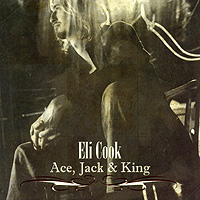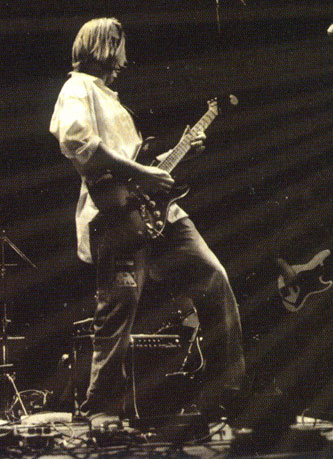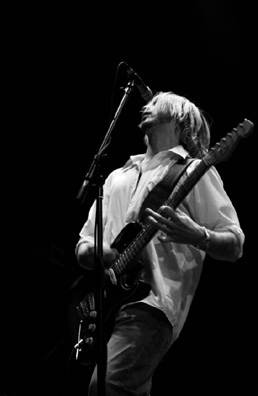 It
seems like every generation gets a crack at reinventing the blues
and at age 25, guitar ace Eli Cook makes a stand for his own
legacy as a blues-rock innovator with the 2011 CD release of Ace,
Jack & King. Cook’s 5th solo album, the 14
track Ace, Jack & King CD is no hippie love fest ala early
‘70s Allman Brothers type blues-rock. Instead, Ace, Jack &
King is a pretty stark, sonic trip into blues lore. Even younger,
21st century guitar superstars like Joe Bonamassa sound more mainstream
and pop oriented than Cook. Although he grew up listening to Metallica,
Nirvana and Rage Against The Machine, Cook soon gravitated towards
the music of blues legends such as Son House, Skip James, Elmore James
and Muddy Waters. Handling all the electric / acoustic guitars and
vocals, Cook gets solid support from his band featuring Brian Thomas
(bass) and Wade Warfield (drums). If you like your blues
straight up and in your face, without sugar coating, posturing or
window dressing, Ace, Jack & King is your album and Eli
Cook is your man. www.EliCook.com
It
seems like every generation gets a crack at reinventing the blues
and at age 25, guitar ace Eli Cook makes a stand for his own
legacy as a blues-rock innovator with the 2011 CD release of Ace,
Jack & King. Cook’s 5th solo album, the 14
track Ace, Jack & King CD is no hippie love fest ala early
‘70s Allman Brothers type blues-rock. Instead, Ace, Jack &
King is a pretty stark, sonic trip into blues lore. Even younger,
21st century guitar superstars like Joe Bonamassa sound more mainstream
and pop oriented than Cook. Although he grew up listening to Metallica,
Nirvana and Rage Against The Machine, Cook soon gravitated towards
the music of blues legends such as Son House, Skip James, Elmore James
and Muddy Waters. Handling all the electric / acoustic guitars and
vocals, Cook gets solid support from his band featuring Brian Thomas
(bass) and Wade Warfield (drums). If you like your blues
straight up and in your face, without sugar coating, posturing or
window dressing, Ace, Jack & King is your album and Eli
Cook is your man. www.EliCook.com
mwe3.com presents an interview
with
ELI COOK
 mwe3: Would
you describe the sound of Ace, Jack & King as modern blues?
You also mentioned the new Ace, Jack & King album had more
of a spontaneous feel to it compared to your earlier albums. What
events led up to the release of the new CD and looking back, how has
your music changed and grown over the years?
mwe3: Would
you describe the sound of Ace, Jack & King as modern blues?
You also mentioned the new Ace, Jack & King album had more
of a spontaneous feel to it compared to your earlier albums. What
events led up to the release of the new CD and looking back, how has
your music changed and grown over the years?
ELI COOK: On this project I wanted to maintain the energy and organic
quality of a raw, very basic recording of material that was written/arranged
either in the studio or only just prior to it. This I feel is a key
element in achieving a genuine rootsy, non-polished blues-based recording.
I think that the entire album has an air of that, even on the tracks
that sound more contemporary... “Snake Charm”, “Death
Rattle pt. 2”, “Crow Jane”... etc . In some ways the
album is very much “modern” blues because of these songs
in particular. The music is completely original and not based at all
upon the traditional blues formats of 12-bars, etc. Simultaneously,
a number of the other tracks are extremely traditional in arrangement
/ instrumentation, though all of them have something very unique and
original thrown in to keep it fresh. Over the years I have learned
that leaving some songs a bit open-ended while going into the studio
can be very important in getting a recording that feels authentic.
Others can be extremely arranged and rehearsed. It’s sort of
like planned chaos, so while it may seem like less thought was put
into it, the fact is that a very great deal of thought and experience
over the years has gone into learning when and how to use this technique
effectively.
mwe3: What is it about the music of the early blues masters such as
Lightnin’ Hopkins, Muddy Waters and John Lee Hooker that shifted
your attention from rock music to the blues as such a young age? And
how about favorite albums in your music collection?
 EC: The
music of the old blues men always appealed to me from a young age.
The stories, the voices and the feel of that music has a quality of
realness and purity that is just not found in much contemporary music.
Remember, these guys were singing songs about real life, and very
few of them ever made any real money doing it, so the music came about
as means of coping with their own existence, not because they were
concerned with trendy hair-cuts, facebook, itunes downloads and who
had the tightest jeans. I see an element of this genuine “music
for the sake of the musician” kind of quality in the grunge rock
movement as well. Groups like Alice in Chains, Soundgarden, Nirvana,
STP, Monster Magnet, Clutch, Jane's Addiction and the like continue
to be a big source of inspiration for me. As far as favorite albums?
My top 5 would be Band Of Gypsys, John Lee Hooker’s Endless
Boogie, Audioslave (self-titled), Stone Temple Pilots
4, and Exile On Main Street by the Stones.
EC: The
music of the old blues men always appealed to me from a young age.
The stories, the voices and the feel of that music has a quality of
realness and purity that is just not found in much contemporary music.
Remember, these guys were singing songs about real life, and very
few of them ever made any real money doing it, so the music came about
as means of coping with their own existence, not because they were
concerned with trendy hair-cuts, facebook, itunes downloads and who
had the tightest jeans. I see an element of this genuine “music
for the sake of the musician” kind of quality in the grunge rock
movement as well. Groups like Alice in Chains, Soundgarden, Nirvana,
STP, Monster Magnet, Clutch, Jane's Addiction and the like continue
to be a big source of inspiration for me. As far as favorite albums?
My top 5 would be Band Of Gypsys, John Lee Hooker’s Endless
Boogie, Audioslave (self-titled), Stone Temple Pilots
4, and Exile On Main Street by the Stones.
mwe3: Also there’s several covers on the Ace, Jack & King
CD of Skip James, an often overlooked artist and composer who
was so influential to U.K. blues-rock bands, for instance, such as
Cream. What was it about Skip’s music that appealed to you so
much and how do you compare the blues originals like Skip James with
all the electric blues-rock bands like Cream and others that followed
in its wake?
EC: Skip James’ music is very haunting and melancholy. His playing
style is also totally original and complex. I remember reading the
lyrics to “Crow Jane” before I heard it, and thinking how
wonderfully dark and violent they were. The version we recorded sounds
nothing like the original, but I think it really captured that earthy,
dark, angsty tone that Skip emanated throughout all of his songs.
The first generation of white blues-rock bands were the ones that
drew attention to music like this by making it appeal to a younger
generation with original arrangements. This is something that I feel
is very important and try to do myself.
 mwe3: What
guitars are do you feature on the new Ace, Jack & King CD
and how do you approach playing and recording with acoustic guitars
versus electric guitars? Also how do certain guitars color and influence
the writing and recording of certain songs?
mwe3: What
guitars are do you feature on the new Ace, Jack & King CD
and how do you approach playing and recording with acoustic guitars
versus electric guitars? Also how do certain guitars color and influence
the writing and recording of certain songs?
EC: There are 4 acoustic guitars and one electric used on the album.
The electric is a 1982 Fender ‘57 Strat reissue with over-wound
Lindy Fralin pickups. That guitar is my work horse; high action, jumbo
frets, and 13 gauge strings. It gets a nice SRV/Tom Morello tone when
I want it.
I used a Taylor Auditorium style guitar for most of the mellower acoustic
songs (“Afrossippi Breakdown”, “Driftin’”,
) and a National Tri-cone Resonator for most of the slide parts, as
well as “Suicide King”, “Draggin' my Dogs”, “Better
Man”, “Sugar & Rain” and “Cocaine Blues”.
My 1969 Gibson J-50 is kept in open drop-C# tuning, and is featured
on the opening track, “Death Rattle”. The final guitar is
a Washburn 12-string (model unknown) that can be heard on “Black
Eyed Dog”, “Catfish Blues” and “Suicide King”.
I definitely choose the instruments for each song based upon the overall
tone/feel that I am trying to achieve. For example, “Cocaine
Blues” was intentionally made to sound like a 1930’s-esque
throwback, complete with room-echo and the resonator. The 12-string
added a wonderful dark and earthy tone to the tunes that featured
it, and each one really calls for that. My Strat has a very aggressive,
dark tone; great for creating an air of reckless, raw physical presence.
This really comes across on the tunes like “Snake Charm”,
“Crow Jane”, and “Death Rattle” (slight return).
mwe3: Why do you think the blues still maintains such a widespread
appeal, even today, among rockers, jazzers and even country musicians?
 EC: The
blues is the cornerstone to rock, country and jazz; plain and simple.
Before you can play any of those genres of music decently on any instrument
or just vocally, you have to have a thorough understanding of the
classic blues forms, styles, and techniques. Without blues, there
would be no Elvis, no Chuck Berry, no Buddy Holly, no Waylon Jennings,
no Wes Montgomery, no Buck Owens, which would mean no Dwight Yoakam,
no Kenny Burrell, no Hendrix, Stones or Zeppelin which would mean
no Aerosmith or Guns n’ Roses. Need I say more?
EC: The
blues is the cornerstone to rock, country and jazz; plain and simple.
Before you can play any of those genres of music decently on any instrument
or just vocally, you have to have a thorough understanding of the
classic blues forms, styles, and techniques. Without blues, there
would be no Elvis, no Chuck Berry, no Buddy Holly, no Waylon Jennings,
no Wes Montgomery, no Buck Owens, which would mean no Dwight Yoakam,
no Kenny Burrell, no Hendrix, Stones or Zeppelin which would mean
no Aerosmith or Guns n’ Roses. Need I say more?
mwe3: How do you balance your time recording and performing your own
music with your ongoing work as a guitar instructor and teacher?
EC: Unfortunately, working as a guitar teacher is pretty sporadic
and unpredictable when it comes to demand. Students come and go constantly,
which means that I have plenty of time for my other musical pursuits.
I usually record during the slower months of the year between December
and February, and spend the rest of the year promoting and performing.
Of course I write every day, even if it’s only in my head, so
there is always plenty of new material to pull from.
mwe3: What guitarists and musicians recording today still influence
your guitar playing and recording?
EC: I try to maintain a very open mind to all new music that I hear.
I try to learn from it and pay attention to the writing, the production,
the arrangement, etc. There is a vast amount to study in any song
besides the notes and the lyrics. Some of my favorite contemporary
artists include Down, Clutch, Chris Cornell, Philip Sayce, Tab Benoit,
Everlast, any of the grunge acts still going (STP, etc...) and Kenny
Wayne Shepherd.
 mwe3:
Can you say something about your future plans for 2012 as far as writing,
touring and recording new music?
mwe3:
Can you say something about your future plans for 2012 as far as writing,
touring and recording new music?
EC: Right now I am beginning a new recording project of more contemporary
blues-based rock. Hopefully that should be released by this summer
in time for the festival season and I can begin promoting at shows
around the US!
Thanks to Eli Cook @ www.EliCook.com



